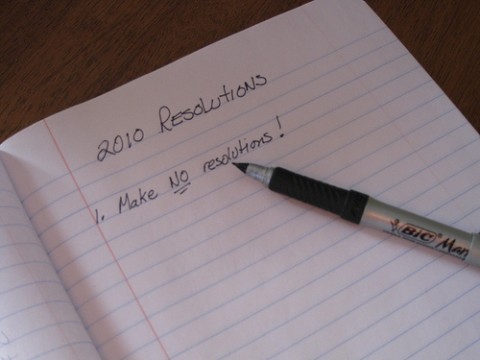Re-Solution to Change
January 7, 2010 Leave a comment
|Photo by katerha|http://www.flickr.com/photos/katerha/4233144961/|
Legion are not just the excuses but the explanations behind the excuses for not living up to our annual New Year’s resolutions. I know these excuses and theorizing about the real reasons for my failings quite well. And yet this year I remain hopeful that I will have more success in honoring my commitments, thanks in part to the work of Robert Kegan and Lisa Lahey. In their book Immunity to Change, the authors lay out a handy set of questions that I believe shed valuable insight on how individuals and groups might hold themselves more accountable to genuine and realistic change aspirations.
In analyzing the pattern of a failed change effort, Kegan and Lahey suggest that we answer the following:
- What is the change in behavior and outcome to which we aspire?
- What is the behavior we manifest instead of what we say we aspire to?
- What does the gap suggest that we are actually committed to?
- What assumptions may underlie our inability to align intention and action, and how might we shift inaccurate assumptions to create better alignment?
As an example, we might say that we are committed to exercising in the new year, but find that instead we stay at home watching TV. Rather than feel bad about this, question #3 has us get curious about what our actions suggest we are more committed to. The case may be that at the end of a long day or week we are more committed to resting, feeling like we don’t have the energy to work out. Taking this a step further, a possible assumption underlying this situation may be that we assume that we have to first feel energized in order to exercise. An alternate perspective is that we will be more energized because we work out. Changing our assumption in this way might just help get us down that road.
Confession time: Two related aspirations I hold for myself this year are to more proactively express appreciation in the workplace and to be more proactively (and demonstrably) loving at home. Now this is not the first time I have set these goals. But this year I understand that my past failures might just be rooted in an assumption I’ve been carrying that appreciation and love are in limited supply, and that I risk something if I am the first or only one to express either. So what if instead I assumed there was an abundance of both, and that taking this step could actually create more? I’m willing to try it!
How about you? What challenges are you or your team trying to re-solve? What assumptions have got you hemmed up? What assumptions will set you free?
No Comments
Thanks Curtis! I love the Kegan/Lahey framework and I appreciate your giving us a glimpse into your own efforts for transformation. A common “problem” in my own change efforts is an “all or nothing” mindset. Too often I won’t meditate at all if I can’t meditate a full hour, or I won’t do any yoga if I can’t do my full routine, or I won’t clean up a little bit if I can’t clean up everything!
I’m wanting to use this framework to look more deeply into that. What assumptions am I making about the actual process of progress? Seems like by not valuing small steps I end up not taking any!
Curtis – I like this. As always, it is all about the framing and lens through which one looks.
Gibran – all or nothing is no way to go about things. Brother Gass would tell you to allow the good to be good enough – the perfect is the enemy of the good.
Charlie, yes a lens is a powerful thing. I think just the mind shift through which we get curious about our existing commitments is tremendous. If we walk around feeling guilty, to me that is not much of a motivator. Plus there is something of a systemic aspect to this, in that we are often intelligently making adjustments to circumstances, albeit with assumptions that may or may not be true. Maybe we should celebrate that we have made a rationale response but understand that we may need to examine our assumptions to be “even better.”